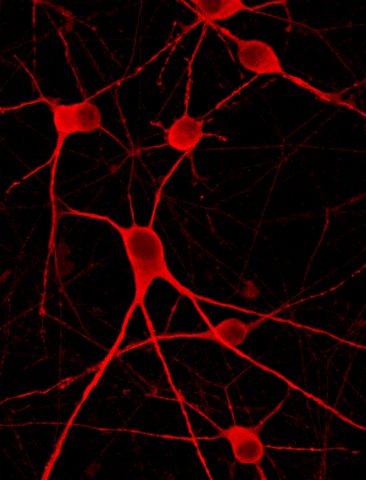- A reliable supply of consistent and physiologically relevant motor neurons is fundamental to the study and screening of potential treatments for motor neuron diseases
- ioMotor Neurons also offer an alternative to animals for neurotoxicity testing in the development of therapeutic products and consumer cosmetics procedures
- ioMotor Neurons are ready for experimentation within four days; they express lower motor neuron markers and display key functional activity
bit.bio, the company coding human cells for novel cures, has launched ioMotor Neurons as its 12th ioCells product this year. This takes the total number of products in the ioCells range - human cells for research and drug discovery - to 20 products, including wild type, CRISPR-ready and disease model cells. The launch of ioMotor Neurons also follows the recent opening of bit.bio’s new manufacturing and automation laboratories by the UK’s Minister for Science, Research and Innovation.
This press release features multimedia. View the full release here: https://www.businesswire.com/news/home/20231206868118/en/

ioMotor Neurons (Photo: Business Wire)
Motor neurons connect to muscles, which they control via electrical impulses. Damage or death of motor neurons can lead to a devastating group of conditions called Motor Neuron Diseases (MNDs). These lead to muscle wasting and weakness and problems with breathing and swallowing.
ALS is one of the most common MNDs, and current estimates indicate it affects more than 200,000 people worldwide.1 Patients progressively lose motor function and eventually suffer fatal paralysis. The development of therapies for MNDs has been compromised by the limited translatability of animal models and the long, inconsistent and difficult-to-scale differentiation protocols for creating motor neurons from induced pluripotent stem cells (iPSCs).
bit.bio’s ioMotor Neurons are designed to address these challenges. ioMotor Neurons are precision reprogrammed from human iPSCs with bit.bio’s opti-ox™ technology, leading to unparallelled biological consistency and scalability. The cells are easy to culture and ready to use in days. They express important lower motor neuron markers and display key functional activity.
Dr Mark Kotter, CEO and Founder of bit.bio said:
“bit.bio democratises access to human cells. ioMotor Neurons are the12th ioCells product we have launched in 2023, demonstrating the unprecedented pace at which bit.bio is able to bring new iPSC-derived cell products to market. This latest addition to our ioCells portfolio will enable scientists to understand and potentially cure devastating motor neuron diseases, a field which is eagerly awaiting treatments for the thousands of patients with conditions such as ALS. We are excited to see the breakthroughs scientists are going to make with our new ioMotor Neurons.”
ioMotor Neurons could also be used to develop in-vitro models for neurotoxicity testing and toxicology screening for therapeutic products development, such as therapeutic proteins and consumer cosmetics procedures. This offers an important alternative to animal testing.
Dr Farah Patell-Socha, VP Research Products at bit.bio, said:
“This launch represents a significant further stride toward our commitment to providing a robust and comprehensive CNS cell portfolio to advancing neurodegenerative research and drug discovery. ioMotor Neurons are an important part of our ALS toolkit that can now be incorporated into motor neuron disease research and early drug discovery workflows in ways that were not previously possible. These highly-defined cells will serve as the basis for the development of additional derivative products for the scientific community, including disease models for ALS which will be available in 2024.”
ioMotor Neurons are now available for early access on the bit.bio website: https://www.bit.bio/products/nerve-cells/motor-neurons-wild-type/ioea1027
Notes to editors
References
1. Estimated incidence of ALS: https://www.nature.com/articles/ncomms12408?origin=ppub
About bit.bio
bit.bio is a synthetic biology company focused on human cells that is advancing medicine (UN SDG9) and enabling curative treatments (UN SDG3). The company does this by industrialising the manufacture of human cells and making them more accessible. The company was spun out of the University of Cambridge in 2016 and has since raised approximately $200m from investors such as Arch Venture, Foresite Capital, Milky Way, Charles River Laboratories, National Resilience, Tencent, Verition Fund and Puhua Capital.
bit.bio’s opti-ox™ precision cell programming and manufacturing technology enables conversion of induced pluripotent stem cells (iPSCs) into any desired human cell type in a single step. This can be achieved within days and at industrial scale, while maintaining exceptional purity and unparalleled consistency.
Our discovery platform extends this approach to any desired cell type by identifying the transcription factor combinations that define cell states (including identity, cell subtype identity, maturity) using high throughput screens and advanced data analysis. We believe that opti-ox can revolutionise regenerative medicine similarly to how CRISPR is unlocking gene therapy.
bit.bio’s cell therapy pipeline, based on txCells™, is focused on serious diseases that lack effective treatments. Our current therapeutic development areas include metabolism and endocrinology, immunology and neurology. Our lead candidate, bbHEP01 based on txHepatocytes, is in development as a treatment for patients suffering from acute liver failure (ALF) and acute-on-chronic liver failure (ACLF) and is expected to enter clinical development in 2025. Complementing our internal pipeline, we have a collaboration with BlueRock Therapeutics (a wholly owned independently operated subsidiary of Bayer AG) focused on regulatory T cell (Treg) based cell therapies.
In addition, our extensive ioCells™ research cell product portfolio, which includes wild type, disease model human cells and CRISPR-ready cells, is opening up new possibilities for studying human biology and developing new medicines in both research and high throughput and high content drug discovery.
For more information, please visit www.bit.bio
View source version on businesswire.com: https://www.businesswire.com/news/home/20231206868118/en/
Contacts
Media contact
Chris Hempel
Spark Public Relations
chris.hempel@sparkpr.com
+1-775-813-0285
Investor contact
Mike Booth, SVP External Affairs, bit.bio
ir@bit.bio
+44 1223 787297






